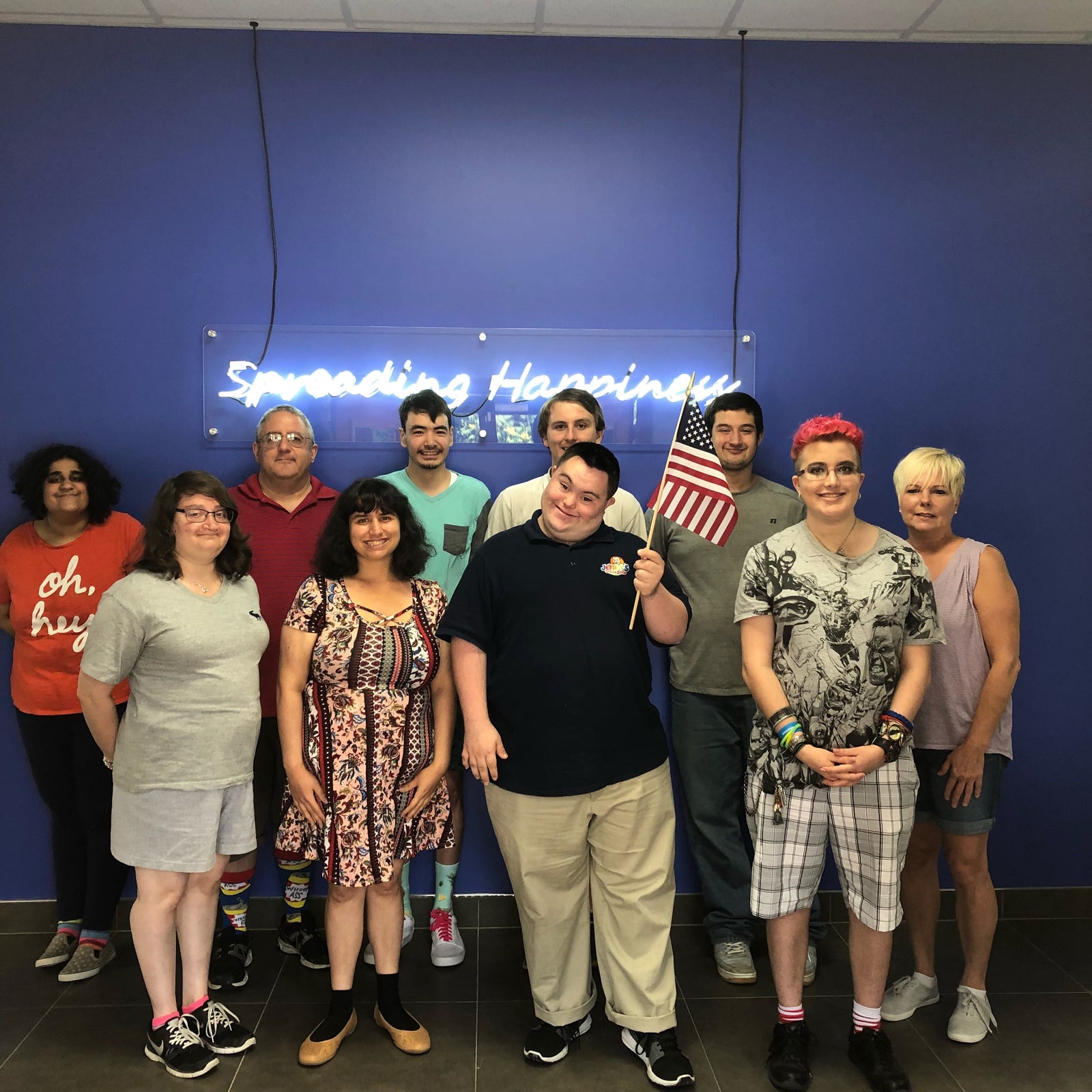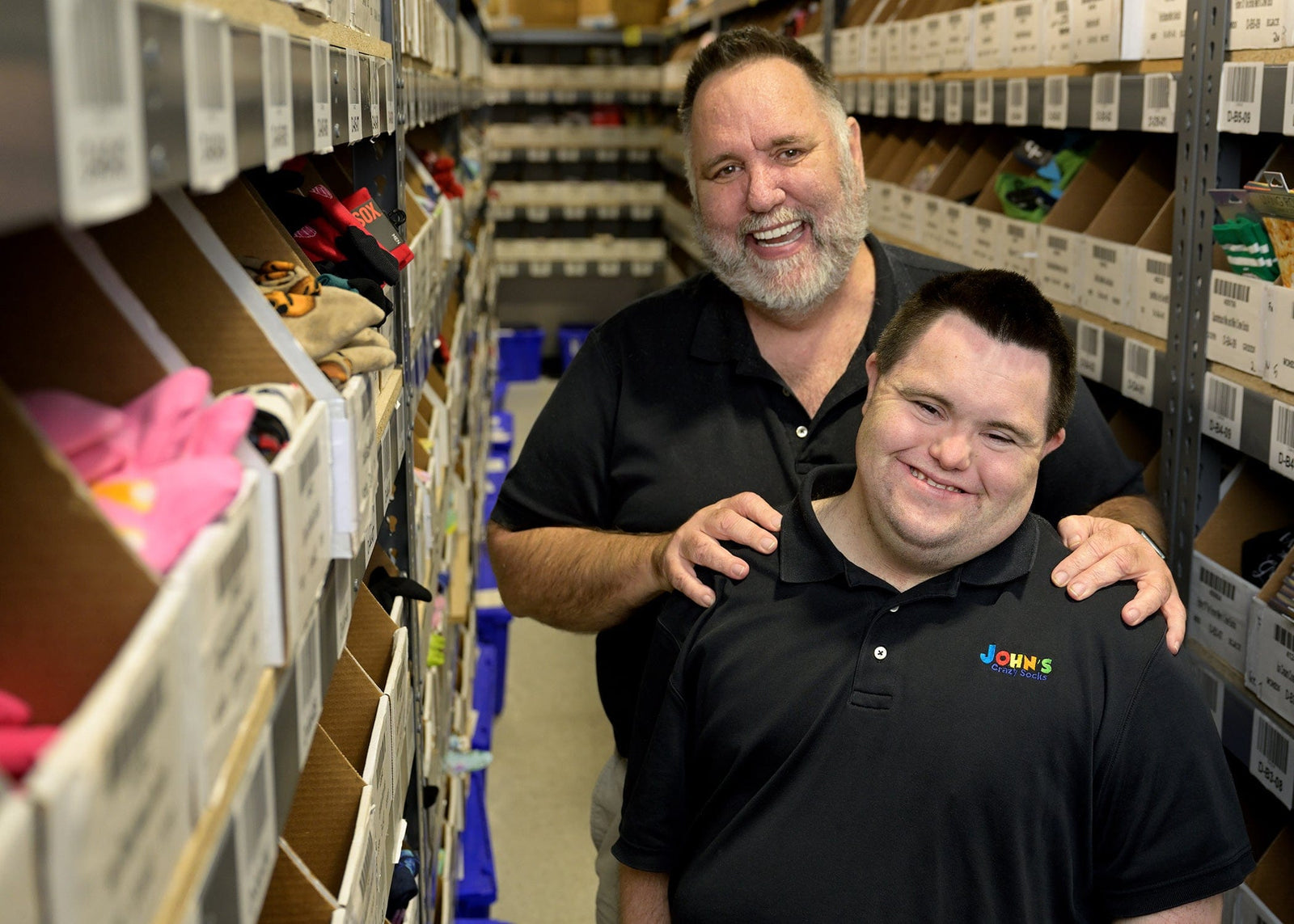How would you respond if you knew that there were as many as 400,000 people in the United States paid less than minimum wage simply because they have a disability? How would you feel if you were told that the minimum wage laws did not apply to you simply because you had a disability?
Sadly, that is the case in the United States and it needs to change. We urge Congress to eliminate the subminimum wage. We urge Congress to pass the Transformation to Competitive Integrated Employment Act (H.R. 2373). This bipartisan bill is sponsored by Representatives Bobby Clark (D-VA) and Kathy McMorris Rodgers (R-Wash).
This issue is deeply personal for us. Can you imagine telling John, who had the idea and the entrepreneurial grit to start John’s Crazy Socks that he did not deserve to be paid a fair wage because he had a disability? Our starting wage is $15 per hour, but can you imagine if we told our colleagues with a disability, what we call a differing ability, that we would pay them less than the minimum wage because of their disability? Yet this is what the current law allows and we must change it.
What does the bill do?
The Transformation into Competitive Integrated Employment Act (H.R. 2373) phases out 14(c) certificates that were created by the Fair Labor Standards Act of 1938. These certificates allow employers to pay people with disabilities less than the minimum wage, called a subminimum wage. These workplaces are often known as sheltered workshops. The Transformation to Competitive Integrated Employment Act also establishes a grant program and a timeline to successfully transition out of the sheltered workshops.
Why is it important for people with disabilities?
People with disabilities who are employed under the 14(c) certificates are often trained to perform tasks that do not build capacity or transfer into skills necessary to transition into other employment options. Only 5% of individuals who go into sheltered employment obtain employment (GAO Report). Sheltered workshops become a trap.
More than 50% of individuals working under a 14(c) certificate earn less than $2.50/ per hour (GAO Report). This practice reinforces the stigmatic misconception that people with disabilities are less productive and creates an artificial competitive barrier to future employment opportunities.

Why is this important to John Cronin and John’s Crazy Socks?
The Fair Labor Standards Act of 1938 is a great piece of American legislation: it eliminated child labor, established the 40-hour work week and created overtime pay. However, Section 14c allows employers to pay people with a disability less than a minimum wage. This is the equivalent of saying that people are subhuman, or as the constitution once said, that certain people are only 3/5 human. It is no longer tenable.
Had John been born in 1938, he might not have survived given the medical challenges he faced at birth. If he did, he most likely would have been placed in an institution. But he was not born in 1938. John Cronin has gone on to start a business (John’s Crazy Socks) that has created 31 jobs and earned millions of dollars. He has been recognized as the EY Entrepreneur of the Year. John is the face of disability employment today.
More than half our colleagues at John’s Crazy Socks have a disability, what we call a differing ability (22 out of 31). They all do good work and contribute to the success of our business. Our starting wage is $15 per hour which is only fair because all of our workers contribute to our mission. Our colleagues show every day what people with differing abilities can achieve.
Given the achievements and productivity of John and our colleagues with differing abilities, it is unconscionable to think that employers could pay them less than a minimum wage.
What about the Sheltered Workshops?
There was a time when sheltered workshops were necessary. That time has passed. All states have programs to move people towards meaningful employment. By definition, the people working in sheltered workshops are performing work, so they should be entitled to the same minimum wage as all employees. And the GAO data shows that the sheltered workshops have become dead-ends for most employees.
The Competitive Integrated Employment Act (H.R. 2373) does include funds to allow the sheltered workshops to transition to pay a minimum wage or to transition their employees to employment where they will receive at least a minimum wage.
Taking Action to Eliminate the Subminimum Wage
Every day, John’s Crazy Socks shows how unfair the subminimum wage is because we share the work that our colleagues with a disability perform. We have been writing to legislators and meeting with legislative staff. In the past three weeks, we have met with a dozen members of Congress and their staffs to urge their support for this bill.
It is time to do right by all our employees. It is time to eliminate the subminimum wage. Please support the Competitive Integrated Employment Act (H.R. 2373). Call your Congressional representative. Write to them. Email them. Knock on their doors. We must end the subminimum wage. Every day we wait is one day too many.




